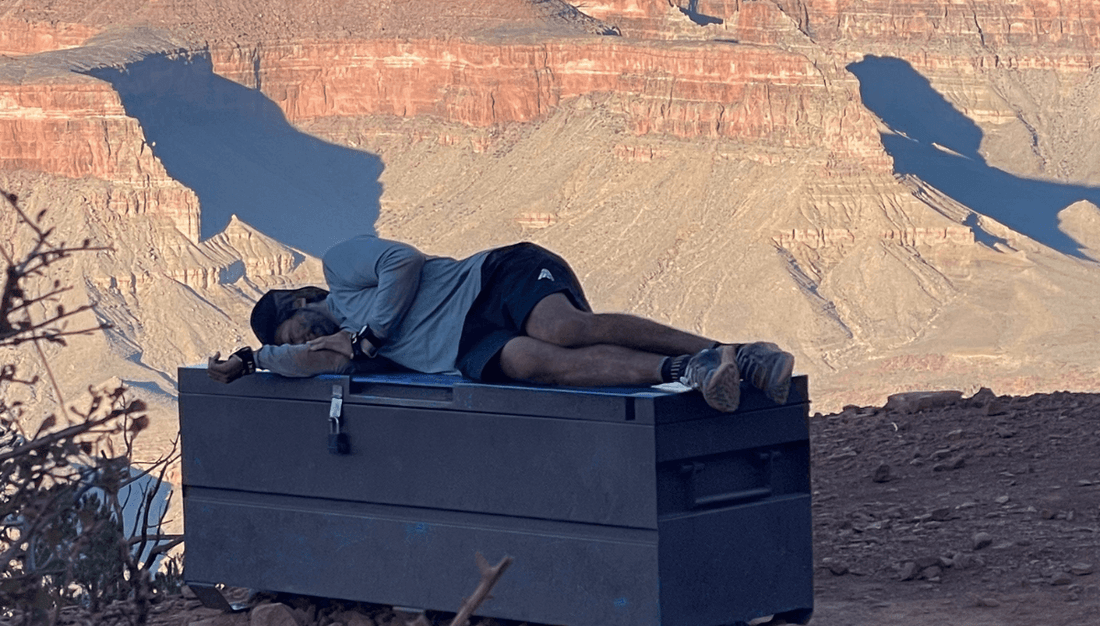
Beyond Labels: Who is Nick Fowler (and his Endurance Nutrition Secrets)
Share
Endurance nutrition becomes critical when chasing Fastest Known Time records on America's most demanding trails. Nick Fowler's transformation from office worker to FKT legend demonstrates how proper fueling supports ultra-endurance achievements.
The Oklahoma hiker who is redefining what's possible on America's most demanding trails
Six years ago, Nick Fowler was "a little chunky" in a suit and tie, "chained to cubicles, dreaming of freedom." Two miles would kick his butt. Today, he holds multiple Fastest Known Time (FKT) records on some of America's most challenging long trails, including a jaw-dropping 800-mile Arizona Trail FKT completed in just 12 days, 17 hours, and 33 minutes, achieved entirely self-supported and nearly half a day faster than the previous supported record.
But ask Fowler what he calls himself, and his answer might surprise you.
Just a Hiker from Oklahoma
"I call myself a hiker," Fowler says simply. "I think everything's hiking. Like if you're running, you're eventually hiking. If you're pack rafting, you have to hike out there. If you're ski mountaineering, you're skinning up and that's hiking. It's all hiking to me."
This perspective, refusing to be boxed into traditional labels, runs deeper than trail semantics. When pressed about whether he deserves to be in the same conversation as FKT legends like Karel Sabbe or Joe McConaughy, Fowler's response is characteristically humble: "I definitely consider myself a nobody. I'm just a hiker. I'm a nobody that's obsessed with the West."
Nick's mindset reflects something profound about how we approach our limitations. As Fowler puts it, "I think the very first line in my book is 'Do things before you're ready.' And I think a lot of times we hold back and we wait till things are perfect, everything's aligned, and I think we get better if we just try."
The Transformation Story
Fowler's journey began with a simple anniversary gift; a road trip with his wife Hannah to visit every national park. What was supposed to be a year-long adventure turned into three years of falling in love with the outdoors. During one of those early adventures, not knowing how to read maps or use a water filter, Fowler accidentally ended up on a 32-mile day hike.
"It kicked my butt. I couldn't walk the next day, but the day after that, I was like, 'That was awesome!'" Months later he recalls, "I started hiking like 70 miles just to find out how far I could hike in a day. I didn't know what FKTs were. I didn't even know what an ultra was."

The appeal of FKTs became clear: "It's fun. I enjoy big miles. You get to see so much. It forces yourself to be outside before sunrise, during sunrise, throughout the whole day, after the sun goes down. You get to see the wildlife at night, the wildlife during the day. Every night, you get to maximize the best views that are possible."
Finding Joy in the Suck
Fowler has a phrase that captures his approach to suffering: "forgetting the suck." When you're pushing big miles, sleep-deprived, with blisters and everything hurting, "it freaking sucks," he admits. "But just something about mountains and big trees and glaciers. That's the stuff that distracts me. You go around the corner and see something pretty, and I'm like, 'Ah, it's so pretty. I want to go check it out.' And you kind of forget about the suck."
This philosophy was tested during his recent Arizona Trail FKT attempt, which nearly ended before it began. On his first attempt, he found himself "puking my guts out in the Grand Canyon," moving so slowly that "it took me two hours and 20 minutes to go one mile." After bailing on that attempt, most people would have called it a season. Fowler rested for exactly two days.
"I was like, 'I'm already out here. Everything's already in place. I can't just let it all go to waste,'" he explains. "My motivation skyrocketed, and I was like, 'I'm just going to start over.'"
The restart paid off. He averaged 70 miles a day for the first four days, carrying all his gear, and maintained a 64-mile daily average across the entire 800-mile trail.

The Art of Self-Supported Adventure
While many elite FKT athletes rely on extensive support teams, Fowler has built his reputation on self-supported efforts and his results speak for themselves. Three of his self-supported FKTs have broken existing supported records, including that Arizona Trail effort that bested Joe McConaughy's supported time by nearly half a day.
The appeal goes beyond just the challenge: "I enjoy being alone in the wilderness. That's probably the biggest thing. Another big plus is it's a hell of a lot cheaper than supported efforts." His Oregon Coast Trail FKT cost him exactly $83, leading him to joke that it's "not only the fastest known time, but it's also the cheapest known time."
Fueling the Impossible
When you're burning through 500+ calories per hour for weeks on end, endurance nutrition becomes critical. Fowler's strategy involves "300 to 500 calories an hour, and then three big, like 800-ish calorie meals a day." This is where RecPak became a game-changer for his efforts.
"I used the very first RecPak I ever had on the Oregon Coast Trail FKT," Fowler recalls. "I was trying out a bunch of different samples from companies, but I remember with that one, I was like, 'Oh damn, that actually worked! That actually gave me some solid, long-lasting energy. I didn't crash or anything.'"
For his Arizona Trail FKT, he scaled up to using one RecPak per day, and the convenience factor proved crucial. "RecPak meals are extremely simple and easy and fast," he explains. "You can drink a RecPak and you've got 700 calories, versus snacking on a dry bar that might take you 30 minutes to an hour to actually eat if you're feeling bad."
The liquid format particularly shines when conditions get tough: "It's a whole lot easier to drink calories than it is to eat calories when you're feeling bad," Fowler mentions this was a lesson learned through multiple FKT attempts where he's puking his guts out.
Nick's experience highlights why strategic endurance nutrition planning separates successful FKT attempts from failed ones.
The Deeper Mission
Despite his remarkable achievements, Fowler maintains perspective about what really matters. Home in Tulsa with Hannah and their new son Canyon, he's "obsessed with the West" but grounded in family. His approach to adventure is refreshingly honest about both the costs and rewards.
"Sometimes I think the harder the things we do, sometimes in the moment we don't like it, but afterwards we're like, 'Oh, that was the best thing I've ever done,'" he reflects.
His recent attempt at a supported Pacific Crest Trail FKT ended when he developed symptoms of rhabdomyolysis, a serious condition where muscle breakdown can cause kidney damage. The decision to stop wasn't easy for someone with "an unhealthy obsession" with the PCT, complete with a tattoo running down his entire leg and PCT memorabilia throughout his house.
But that setback doesn't diminish what he's already accomplished or what he represents: proof that extraordinary things become possible when you stop waiting for perfect conditions and start moving forward.
The Trail Ahead
"I've seen people go out and do crazy, fun, fast, inspiring things, and it's inspired me to do similar things," Fowler says. "I guess I hope in turn that inspires other people to do even bigger things."
Whether you're targeting your first long trail or chasing your own impossible goals, Fowler's approach offers a blueprint: strip away the labels, embrace the suck, invest in gear that won't let you down, and remember that sometimes the most extraordinary journeys begin with just putting one foot in front of the other… preferably on a trail heading west.
Ready to fuel your own impossible goals? Discover how RecPak's complete liquid nutrition is helping adventurers like Nick push the boundaries of what's possible.
